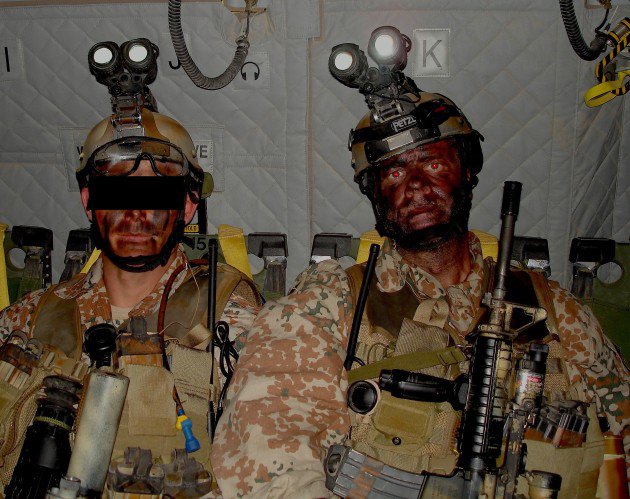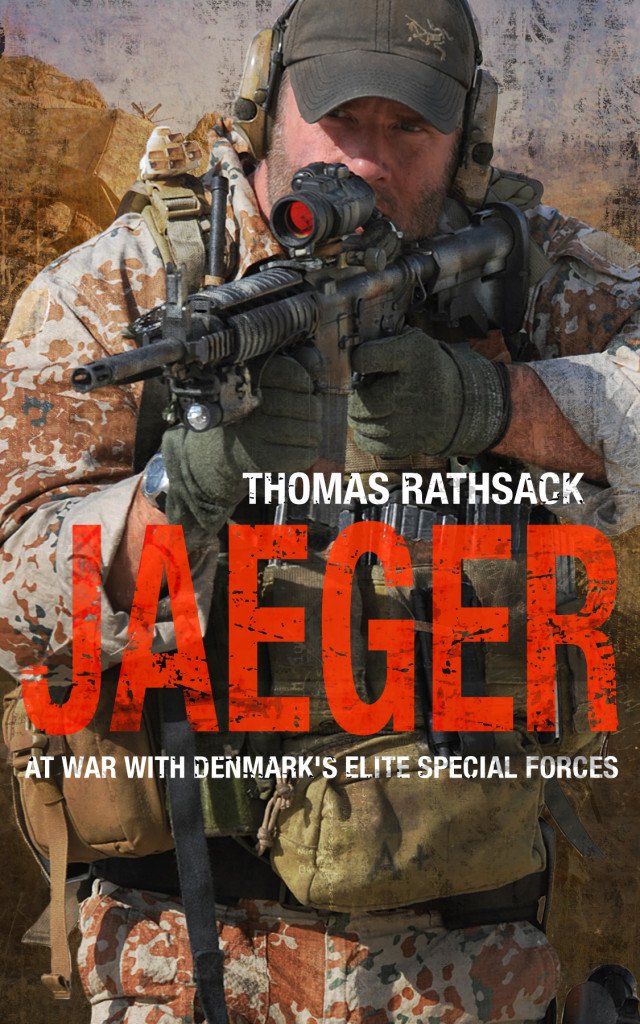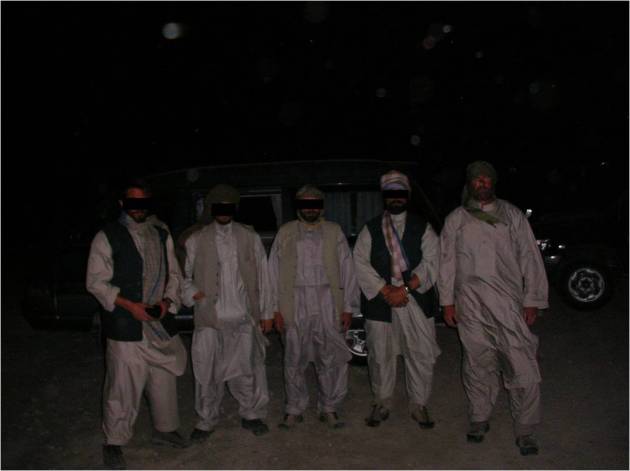Hol Dir den wöchentlichen SPARTANAT-Newsletter.
Dein Bonus: das gratis E-Book von SPARTANAT.

Jæger – im Krieg mit Dänemarks Elite
Westliche Spezialkräfte im Einsatz in Afghanistan ist kein großes Geheimnis. Aber wenn relativ detailierte Schilderungen dazu veröffentlicht werden, regen sie doch auf.
Westliche Spezialkräfte im Einsatz in Afghanistan ist kein großes Geheimnis. Aber wenn relativ detailierte Schilderungen dazu veröffentlicht werden, regen sie doch auf. Thomas Rathsack war Mitglied der dänischen Spezialkräfte, des Jæger Korpset. Als sein Buch „Jæger – I krig med eliten“ 2009 erscheinen sollte, wollte das Vertedigungsministerium die Veröffentlichung verhindern. Die Tageszeitung „Politiken“ veröffentlichte damals den ganzen Text in Folge. Unsere Freunde bei SOFREP haben das Buch ins Englische übersetzen lassen, wir bringen davon einen Auszug: Undercover in Afghanistan, als Nahsicherung für die „Spooks“ vom Geheimdienst.
Ich schaue nicht aus wie ein Afghane – hab ich nie, werde ich nie. Meine schwere Statur, der breite Kiefer und skandinavischer Gesichtsschnitt sind weit entfernt vom schmalen Gesicht des Durchschnittsafghanen mit seiner langen, hakigen Nase. Aber ich habe meinen Bart und meine Augenbrauen fast schwarz gefärbt, mein Gesicht und meine Hände sind mit einer braunen Hautcreme bemalt. Ich trage einen afghanischen Turban am Kopf und das ebenfalls traditionelle Salwar Kameez an meinem Körper bestand aus einer Tunika in Khaki und einem weitgeschnittenen Paar Hosen.
Unter der Tunika war ich mit einer kugelsicheren Weste ausgestattet, im Gürtel eine geholsterte 9mm H&K USP Pistole, zwei extra Magazine, ein Gerber Klappmesser und ein Funkgerät, das am Kabelende mit einem diskreten, hautfarben gegossenen Ohrstück ausgestattet war. Meine Lowa Desert Boots waren der einzige Ausrüstungsgegenstand, der mich auf den ersten Blick als Soldat verraten hätte. Aber wenn irgendetwas falsch laufen würde, bräuchte ich den festen Stand.
Nach ein paar Jahren draußen war ich wieder zurück in Afghanistan. Dieses Land wollte mich einfach nicht loslassen. Ich war in einer der größeren Städte im Mittelteil des Landes und das zusammen mit fünf anderen Jægern. Ich befand mich in der anonymisiertesten und zugleich geheimsten Rolle meiner Karriere. Die Aufgabe war „Top Secret“. Wir operierten undercover mitten unter der lokalen Bevölkerung. Keine Uniform. Keine sichtbare Bewaffnung. Keine militärische Fahrzeuge.
Bei Tageslicht wären wir sofort aufgefallen. Aber bei Nacht, in diesem Toyota mit den dreckigen Schreiben und bei der schlechten Straßenbeleuchtung, steigen unsere Chancen nicht entdeckt zu werden dramatisch.
Mit mir im Auto war Mikkel, mein alter Freund von den Aufklärungsoperationen in den umliegenden afghanischen Bergen. Wir waren verkleidet und bei Nacht bei der Arbeit, wie immer,—während die Stadt schläft. Bei Tageslicht wären wir sofort aufgefallen. Aber bei Nacht, in diesem Toyota mit den dreckigen Schreiben und bei der schlechten Straßenbeleuchtung, steigen unsere Chancen nicht entdeckt zu werden dramatisch. Das Innenleben des Wagens haben wir mit Lokalkolorit ausgeschmückt und ihn ewig nicht gewaschen, so dass er sich perfekt in seine Umwelt einfügte.
Das elende Aussehen der Karre täuschte über ihr perfektes mechanisches Innenleben hinweg. Motor, Getriebe, Stoßdämpfer, Bremsen und Reifen waren alle ziemlich neu. Wir pumpten auch Flüssigkeit in die Reifen, so dass man sich mit dem Auto noch gut weitere 25 Kilometer absetzen kann, wenn sie ein Loch haben.
Dadurch, dass wir undercover unterwegs waren, würden wir unsere Waffen nur verwenden können, wenn wir extrem unter Druck kämen. Dennoch, würde das schlimmstmögliche Szenario eintreten, würden wir sehr anständig kämpfen können, trotz unserer sparsamen Ausstattung. Unsere C8 Karabiner – Close Quarter Battle (CQB) Ausführungen mit gekürzten Läufen – waren einsatzbereit, versteckt unter einem dunklen Tuch zwischen den Vordersitzen des Autos. Eine Pistole im Holster war als Backup auch zwischen den Sitzen. Sechs Magazine, alle mit 28 Patronen gefüllt, waren an der Tür befestigt und ganz diskret mit Stoff verdeckt. Hand- und Rauchgranaten waren unter den Sitzen verborgen. Dort waren auch unsere Notfalltaschen versteckt, darin extra Munition, Nachtsichtgeräte, ein Satellitentelefon, Batterien, 500 Dollar in Cash, Wasser und Notfallnahrung. Sollten wir gezwungen sein, das Fahrzeug zu verlassen, war es überlebenswichtig, dass wir unser Zeugs mitnehmen.
In die Operation eingebunden war ein Informationsbeschaffer, ein Geheimagent mit Mitte Dreißig, dessen Deckname Eric lautet. Seine Aufgabe war es, Informationen für Entscheidungsträger auf Regierungslevel in der westlichen Militärkoalition zu sammeln. Informationen dieser Art sind immer sehr sensibel, und die, die sie hatten, waren meist einflussreiche Leute oder hatten enge Beziehungen zu sehr wichtigen Menschen. Eric traf sich mit ihnen und versuchte das Vertrauen von solchen Quellen zu gewinnen, was etwas war, das nicht bei einer Tasse Tee am Nachmittag eintreten konnte. Solche Infiltrationen sind langsam und risikoreich.
 Erics Arbeit war oft einsam und erforderte großes kulturelles, politisches, sprachliches und auch soziales Verständnis. Ein technisches Verständnis von einem Job zu haben ist die eine Seite, aber ein Agent, dem einfach die sozialen Fähigkeiten fehlen, um seine Quelle zu bearbeiten, der wird auch nichts liefern können. Während manche Informanten keine Prinzipien haben und ganz einfach Bezahlung für Informationen wünschen, sind die wertvollsten jene, die von einer Ideologie angetrieben werden. Und die brauchen eine besonders feinfühlige Behandlung.
Erics Arbeit war oft einsam und erforderte großes kulturelles, politisches, sprachliches und auch soziales Verständnis. Ein technisches Verständnis von einem Job zu haben ist die eine Seite, aber ein Agent, dem einfach die sozialen Fähigkeiten fehlen, um seine Quelle zu bearbeiten, der wird auch nichts liefern können. Während manche Informanten keine Prinzipien haben und ganz einfach Bezahlung für Informationen wünschen, sind die wertvollsten jene, die von einer Ideologie angetrieben werden. Und die brauchen eine besonders feinfühlige Behandlung.
Selbstverständlich beruhte der Erfolg von Eric auch darauf, dass seine wahre Identität nie aufgedeckt wurde. Er war ständig inkognito unterwegs. Eric und seine Kollegen waren sehr ruhig, nicht nur professionell, sondern auch in ihrem Privatleben. Nur wenige ihrer Freunde wissen, womit sie ihren Lebensunterhalt verdienen. In Erics Fall wusste es nicht einmal die eigene Familie …
Eric bevorzugte es allein zu arbeiten, ohne uns als Schutzschild. Je mehr Leute involviert sind und je größer das Setup, desto größer ist die Signatur der Operation und umso größer ist die Gefahr, dass sie aufgedeckt wird. Aufzufliegen würde nicht nur uns unmittelbar in Gefahr bringen, sondern auch die Glaubwürdigkeit seiner Organisation untergraben. Seine Organisation hatte gleichwohl Afghanistan gegenwärtig als so gefährlich eingestuft, dass sie das Jæger Korpset anstellten, um ihren Mann zu schützen.
Unsere Aufgabe war es, Eric zu beschützen und zu den Treffen mit seinen Informanten zu transportieren. Das war eigentlich recht simpel, aber es forderte unsere Kreativität heraus, weil wir mit dieser Art von Operation nicht vertraut waren.
Normalerweise konnten wir mit Unterstützung rechnen, wenn eine Sache schief läuft. Hier waren wir komplett auf uns allein gestellt.
Normalerweise konnten wir mit Unterstützung rechnen, wenn eine Sache schief läuft. Hier waren wir komplett auf uns allein gestellt. Wenn hier etwas schief gehen würde, gäbe es keine Quick Reaction Force, kein Gunship und keinen Jagdbomber, den wir rufen könnten. Unsere Funkgeräte waren nur dafür da, um zwischen unseren zwei Autos kommunizieren zu können. Es gab niemanden anderen, den wir anfunken könnten. Niemand, außer gerade ein paar der vertrauenswürdigsten Kameraden, wusste überhaupt, dass wir in der Gegend waren. Und natürlich war es besonders wichtig, dass unsere Identität nicht auffliegt. Wenn wir als westliche Soldaten erkannt würden, würden wir nicht nur getötet, sondern es wäre unseren Kameraden und Alliierten unmöglich gemacht werden im selben Gebiet zu operieren.
Monatelang hatten wir zu Hause in Dänemark mit dem Jæger Korpset für diese Mission geübt. Der Hauptfokus lag dabei auf der Frage, wie man in und um ein Fahrzeug operiert, das unsere Operationsplattform sein würde –und das man nur in Notfällen verlässt. Wir haben Fahrtechniken in alten, ausgeranzten Fahrzeugen geübt. Wir hatten viel Spaß dabei, wenn wir den Wagen in ein Möchtegern-Rennauto verwandeln konnten, mit hoher Geschwindigkeit 180-Grad Wendungen und Schleuder- und Ausweichmanöver trainieren mussten. Wir übten Fahrzeugbeschattung auf den Landstraßen und in kleineren Provinzstädten in Dänemark. Wenn man mehrere Fahrzeuge verwendet, die überschlagend bei der Beschattung verwendet werden, reduziert man die Wahrscheinlichkeit entdeckt zu werden. Wir lernten auch, auf was man vorbereitend achten muss, damit man vermeidet, selbst beschattet zu werden. Wenn wir verfolgt würden, lernten wir in halsbrecherischer Geschwindigkeit zu fliehen. Besonders diesen Teil haben wir besonders genossen, wenn wir ihn auf den schmalen, dunklen Landstraßen der Heimat geübt haben. Mehr als einer unserer Dummy-Agenten saß danach mit weißem Gesicht zusammengekauert auf der Rückbank …
Wir waren die ersten dänischen Soldaten, die dienstlich einen Make-up-Kurs abschließen durften: wir lernten dabei wie man Augenbrauen färbt, die Haut dunkler macht und Bartteile anklebt.
Ein anderer Ablauf, den wir einübten, war das Aufgreifen eines Informanten an einem bestimmten Ort zu einer bestimmten Zeit. Ein alternativer Treffpunkt und Notfallpläne mussten vorab organisiert werden. Wir übten in den Autos auch Kampftechniken für Auseinandersetzungen auf engstem Raum, für den Fall dass wir auf einen widerspenstigen Feind stoßen sollten. Wir mussten Phrasen und Vokabel in Pashto lernen, der am weitesten verbreiteten Sprache in Afghanistan. Und letztendlich waren wir die ersten dänischen Soldaten, die dienstlich einen Make-up-Kurs abschließen durften: wir lernten dabei wie man Augenbrauen färbt, die Haut dunkler macht und Bartteile anklebt.
Übungen sind die eine Sache, echte Operationen etwas ganz anderes. Ich war am Steuer des alten Toyotas als wir aus dem Hangar über eine schmale Schotterstraße fuhren, hin zu einem Tor in der entferntesten Ecke unserer Basis. Wenn wir sie nicht verwendeten, wurden die Fahrzeuge in einem alten, verlassenen Hangar abgestellt, zu dem niemand Zugang hatte, außer uns. Dort wechselten wir auch die Bekleidung und schminkten uns für unsere nächtlichen Ausflüge.
Mikkel saß im Beifahrersitz, ganz dezent überprüfte er das GPS und die Stadtkarte. Ich verstand mich gut mit Mikkel und hatte absolutes Vertrauen, dass er, wie immer, seine Aufgabe einwandfrei bewältigen würde. Jahre zurück war er mein Partner bei einer extremen und erschöpfenden Operation in den Bergen im südöstlichen Afghanistans. Damals hat er sich meinen höchsten Respekt errungen. Er war ein großartiger Partner.
Hinter dem Tor fuhren wir links und dann in Richtung Stadtzentrum. Die vier anderen Männer unseres Teams befanden sich etwa hundert Meter hinter uns, ohne Sichtverbindung, in einem alten Toyota HiAce Minibus. Der befand sich allerdings im gleich guten technischen Zustand wie unser Fahrzeug. Bei den hinteren Fenstern hatte er Vorhänge, was in der Gegend normal war und uns die Möglichkeit gab, mit Informanten im Fahrzeug zu sprechen – ohne dass man gesehen wird.
Eric war heute bei einem Treffen in der Stadt und musste bei einer kleinen Allee aufgeklaubt werden. Die Fahrt in Richtung Stadt führte uns durch dunkle, schlaglochübersäte Straßen, die meist ohne Belag auskommen. Es war ein friedlicher und ruhiger Ort, fast ohne jeden Verkehr. Es wäre sogar von Vorteil gewesen, wenn hier mehr Autos wären, so dass wir uns zwischen ihnen verbergen könnten. Es gab keine Mullahs, die die Gläubigen zum Gebet riefen. Kein Licht in den Häusern. Wir sahen nur wenige Menschen zu Fuß und gelegentlich Radfahrer auf ihren alten Rädern. Keine Frauen oder Kinder. Aber Hunde gab es jede Menge, immer auf der Suche nach Wasser und Futter.
Ein überraschender Checkpoint könnte zu einem Desaster für unsere Mission werden. Eine Taschenlampe in meinem Gesicht würde mich sofort enttarnen.
Mikkel war damit beschäftigt sich auf die geplante Route zu konzentrieren. Ich fuhr langsam, so dass er genug Zeit hatte, Karte und GPS mit einer kleinen Taschenlampe zu checken. Wir wussten mehr oder weniger genau wo die afghanischen Regierungstruppen ihre Checkpoints errichtet hatten, aber wir waren vorsichtig für den Fall, dass sie sich verschoben hatten. Das wären schlechte Neuigkeiten, wenn sie es getan hätten; ein überraschender Checkpoint könnte zu einem Desaster für unsere Mission werden. Eine Taschenlampe in meinem Gesicht würde mich sofort enttarnen. Wenn einer der Wachsposten stur wäre und darauf bestehen würde, zu wissen, wer wir wären und was wir machen, könnte die Konfrontation eskalieren, obwohl wir eigentlich den selben Feind bekämpfen, die Taliban und al-Qaida.
Das andere Auto, der Minibus, fuhr auf einer Strecke parallel zu uns. Wir hatten dazu einige Wegpunkte auf der Karte festgelegt, die wir über Funk mitteilten. So wussten wir immer, wo das andere Fahrzeug gerade war. Manchmal fuhren wir auf gewissen Strecken auch gemeinsam und hatten die Lampen beim Hecklicht links und vorne rechts bei beiden Fahrzeugen gelockert, so dass wir uns in der Dunkelheit identifizieren konnten. Das Risiko, dass man wegen nicht korrekter Beleuchtung des Fahrzeuges in Afghanistan angehalten würde, gab es nicht.
 Mikkel wies mich an, auf einer Straße mit einer großen Kreuzung links abzubiegen. Ungefähr 100 Meter die Straße hinunter konnten wir die Umrisse von Militärfahrzeugen sehen und Leitbleche, die den Verkehr kanalisierten. Das war ein Checkpoint, der nicht auf unserer Karte eingezeichnet war. Mikkel fluchte. Es gab keine Möglichkeit mehr umzudrehen. Wenn ich zurückgesetzt oder umgedreht hätte, würde das zeigen, dass wir etwas zu verbergen hätten. Wir hatten keine andere Möglichkeit als weiterzufahren.
Mikkel wies mich an, auf einer Straße mit einer großen Kreuzung links abzubiegen. Ungefähr 100 Meter die Straße hinunter konnten wir die Umrisse von Militärfahrzeugen sehen und Leitbleche, die den Verkehr kanalisierten. Das war ein Checkpoint, der nicht auf unserer Karte eingezeichnet war. Mikkel fluchte. Es gab keine Möglichkeit mehr umzudrehen. Wenn ich zurückgesetzt oder umgedreht hätte, würde das zeigen, dass wir etwas zu verbergen hätten. Wir hatten keine andere Möglichkeit als weiterzufahren.
Mikkel versteckte seine Karte und das GPS unter dem Sitz während ich überprüfte, ob die Waffe an ihrem Platz war. Es war 1 Uhr nach Mitternacht. Ich hoffte, dass die afghanischen Wachposten müde sein und uns durchwinken würden. Aber als wir uns annäherten, trat eine der Wachen mit AK-47 auf die Straße und deutete uns, dass wir zu stoppen haben. Jetzt fluchten Mikkel und ich. Ich kurbelte das Fenster hinunter und fuhr langsam zu ihm hin.
„Salaam Alaykum“, grüßte er uns.
Er war jung und hatte eine helle, klare Stimme. Und er hatte noch nicht mein Gesicht gesehen.
„Wa Alaykum as-Salaam“, antwortete ich leise und hoffte, dass er nicht meinen Akzent erkannte.
Er nahm seine Taschenlampe. Ich bereitete mich auf das Schlimmste vor. Er schaltete das Licht an und leuchtete in das Auto.
Er nahm seine Taschenlampe. Ich bereitete mich auf das Schlimmste vor. Er schaltete das Licht an und leuchtete in das Auto. Der Strahl fand Mikkel, aber der Wachposten schien nicht interessiert an ihn, stattdessen kam er zurück zu mir und leuchtete mir direkt ins Gesicht. Dort blieb er für lange Sekunden stehen und ich fühlte mich wie ein kleines Kind, das man gerade beim Stehlen erwischt hatte – ungeschützt, verletzlich und in Erwartung dessen, dass es sofort bestraft wird.
Dann sagte die Wache etwas, das ich nicht verstand. Sein Tonfall aber war freundlich und schien in keinster Weise aggressiv. Er beugte sich in Richtung meines Gesichtes und muss sofort erkannt haben, dass ich kein Eingeborener war.
„Tha tsanga ye“, fragte ich mit freundlicher Stimme. „Wie geht es Dir?“
Er nickte, aber er sagte nichts. Es gab keinen Zweifel, dass er meine Verkleidung durchschaut hatte. Es wäre nur umso verdächtiger, wenn ich mit meinem kleinen Repertoire an Pashtophrasen weitergemacht hätte.
Ich griff nach einem kleinen Bündel 50 Dollar Noten, das in einem Spalt der Fahrzeugverkleidung versteckt war. Mein Notfallgeld.
Ich spielte ein bisschen damit, gab ihm langsam einen Geldschein davon und sagte auf Englisch: „Thank you.“
Er blieb leise, aber das Licht schien auf den 50 Dollar Schein, er musterte ihn mit Interesse. Die Summe entsprach für ihn vermutlich einigen Monatsgehältern. Die Taschenlampe wurde ausgeschalten. Er blickte zu den anderen Wachposten, die gerade bei einem Jeep ein Schwätzchen hielten. Dann steckte er das Geld ein.
„Okay“, meinte er ganz leise.
Was für ein Glück, dass er keinen Grund gesehen hatte, Probleme zu machen, und dass er sich selbst einen netten, kleinen Bonus gönnen konnte.
„Tashakkur“, sagte ich dankend zu ihm. Ich gab den Gang rein und fuhr langsam die Straße hinunter.
Mikkel und ich atmeten tief auf. Lang lebe mein Notfallgeld.
Wir bringen den Auszug aus dem Buch mit freundlicher Genehmigung von SOFREP.com. Das Buch von Thomas Rathsack gibt es leider noch nicht auf Deutsch, aber unsere Freunde von SOFREP.com haben es auf Englisch in den USA veröffentlicht. „Jaeger – at war with Denmark’s Elite Special Forces“ gibt es für den Kindle um Euro 9,21. Es soll übrigens im Frühjahr 2016 in deutscher Sprache erscheinen.
Thomas Rathsack im Internet: www.thomasrathsack.dk
SPARTANAT ist das Online-Magazin für Military News, Tactical Life, Gear & Reviews.
Schickt uns eure News: [email protected]
Werbung
Hol Dir den wöchentlichen SPARTANAT-Newsletter.
Dein Bonus: das gratis E-Book von SPARTANAT.


